Taste Review #149 – Glenugie 32 (SV)
“Times, they are a changing” sang Bob Dylan. Whilst it is true that nothing stands still, as human beings most of us thrive on being surrounded by things that are familiar, that we are comfortable using, things that make us feel happy. People like things, it’s no secret. For me, my first love is music. While I’m not a talented musician in any way, shape or form despite owning a handful of musical instruments, I do love listening to music and have a CD / record collection to back that up. I’m sitting here wondering how many readers have actually noticed that most of my articles or reviews start with some sort of connection to music, usually song titles. The hardest one was my Speyburn 18 review but that nicely tied into thoughts about the life of Queen Elizabeth II.
One thing I miss more than the Queen (and believe me, there are plenty of those) is the passing of my favourite record shop in Aberdeen, One-Up records. I seem to remember them on George Street, as well as a shop in Rosemount Viaduct. Both shops closed to amalgamate to a larger, single shop in Diamond Street, just off of Union Street which was formerly the main shopping area of Aberdeen. Eventually they expanded again and moved to Belmont Street, but events beyond the control of the owners were already in play. The beginning of the end was in motion and I’m not sure if either of the two owners realised this at the time. If I have timed my release of this blog correctly, it will coincide with the 10th anniversary of the demise of One-Up. And I’m still mourning.

The passing of this record emporium is pretty traumatic, and while this may sound over dramatic, it isn’t. I used to spend hours there looking for new music when I got home from a work trip. Walking out with less than 5 albums was rare. But with an increase of streaming and a decline in the amount of people buying physical music, coupled with crippling rates, the end was nigh. With one of the owners wanting to retire, the fate of the shop was sealed. Never to return.
About 10 months after One Up closed, I moved to the Highlands and found a new independent record store – Imperial Records in the Inverness Victorian Market. A year later it too was gone, with an all too familiar story of falling physical sales.
Music and whisky do have slight parallels if you care to think of it in a similar way to me. If the wider market rejects it, eventually it is lost. Things we treasure will either change or disappear completely. While we are told that for whisky we’ve never had it so good with choice and variety, the thing is that has been the same with the music industry. It is my curmudgeonly feeling that just because we have more, doesn’t necessarily make it better. That’s an unfair statement to make considering both are just a matter of preference and taste. But while it could be argued that there are no such things as bad whisky or music, I’d argue there is but thankfully these are very much in the minority. Loch Dhu or Fujikai 10 are the ones that spring to mind that got universal disapproval from the enthusiast, becoming the Marilyn Mansons of the whisky world.
The whisky I’m tasting for this article is from a lost distillery, Glenugie. Formerly the most eastern whisky distillery in Scotland, it had a chequered history throughout its life until drawing its last breath in 1983, the first of many to fall in the mass industry cull of the next 2-3 years. I’ve already tasted a whisky from this distillery for this blog, and you can read this here. This sample was a very generous swap from @ayewhisky on Twitter, and I’ve had it for two years while waiting for a suitable occasion. It never came, but if remembering glories of the past such as the best record shop in Northern Scotland, I might as well reminisce about a distillery long gone.
Glenugie 32 y.o (1977) – Signatory Vintage
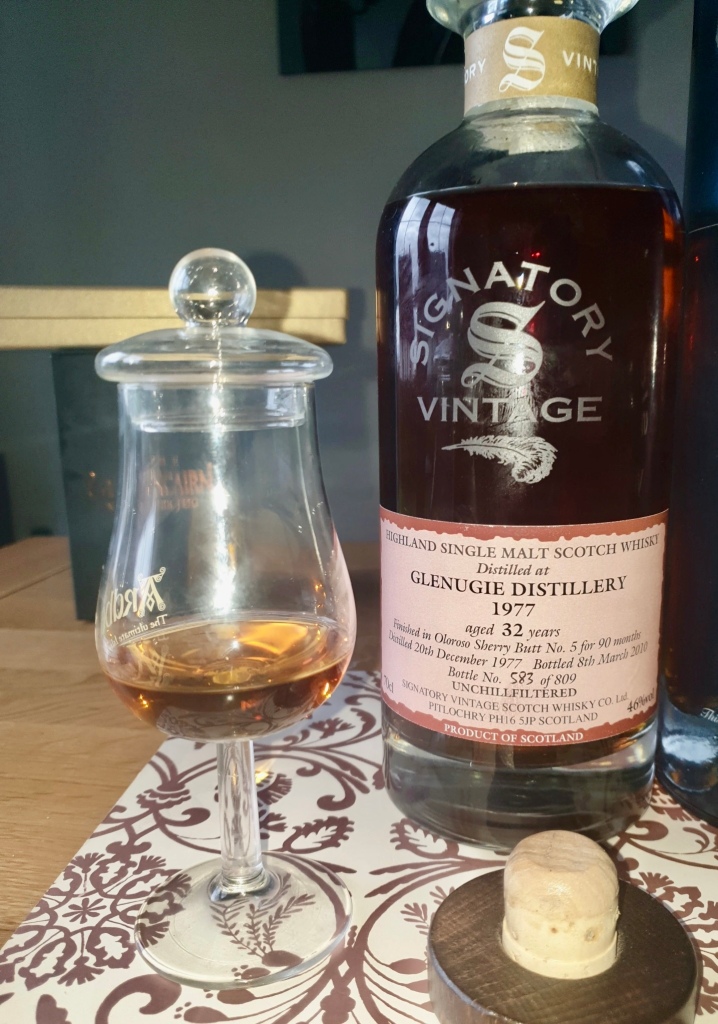
Region – Highland Age -32 y.o Strength – 46% abv Colour – Russet Muscat (1.3) Cask Type – finished in Oloroso Sherry butt for 7.5 years. Colouring – No Chill Filtered – No
Nose – Very reserved at first. Sweet. As it was coming to a more normal room temperature sitting beside me on the table, I could swear I could smell apples and honey. Rubbing a bit on my skin, the aroma reminded of of Dark Milk Chocolate with fondant, similar to those Fry’s bars you used to get. Back to the glass and I get the sherry notes appearing. Raisins, figs, dark cherries. A hint of dusty leather and beeswax.
Palate – medium to full body, syrupy but not too sweet. Turns astringent and slightly woody. Plums, figs, expresso, nutmeg. Slightly dusty again. Still no real burn yet, Dark chocolate orange. Gets more spicy on repeated sips, ginger and black pepper. Adding water made the mouthfeel turn buttery, and for me accentuated the sulphur note that I initially got in the finish giving a burnt rubber taste. But left to breathe for another 15 mins, this turned into a sweet drop, with the darker fruit gums getting added into the above mix. The astringency gets minimised; I can’t believe how sweet this turned.
Finish – The whisky develops into more spicy and astringent notes, becoming tannic and reveals a hint of sulphur but not in a too unpleasant way. The fruit is still there, but there is a more prominent sharpness to it, like passion fruit. I have a slight off note similar to a corked wine, leading to a slightly mineral / metallic combination right at the end. After adding the water and waiting, the increased sweetness left me with a long, almost candy sweet finish, reminding me of sugared almonds. The metallic and mineral notes almost vanished, with fruity notes replacing them. A surprise finish for a dram initially that I wasn’t enjoying as much as I thought I should be.
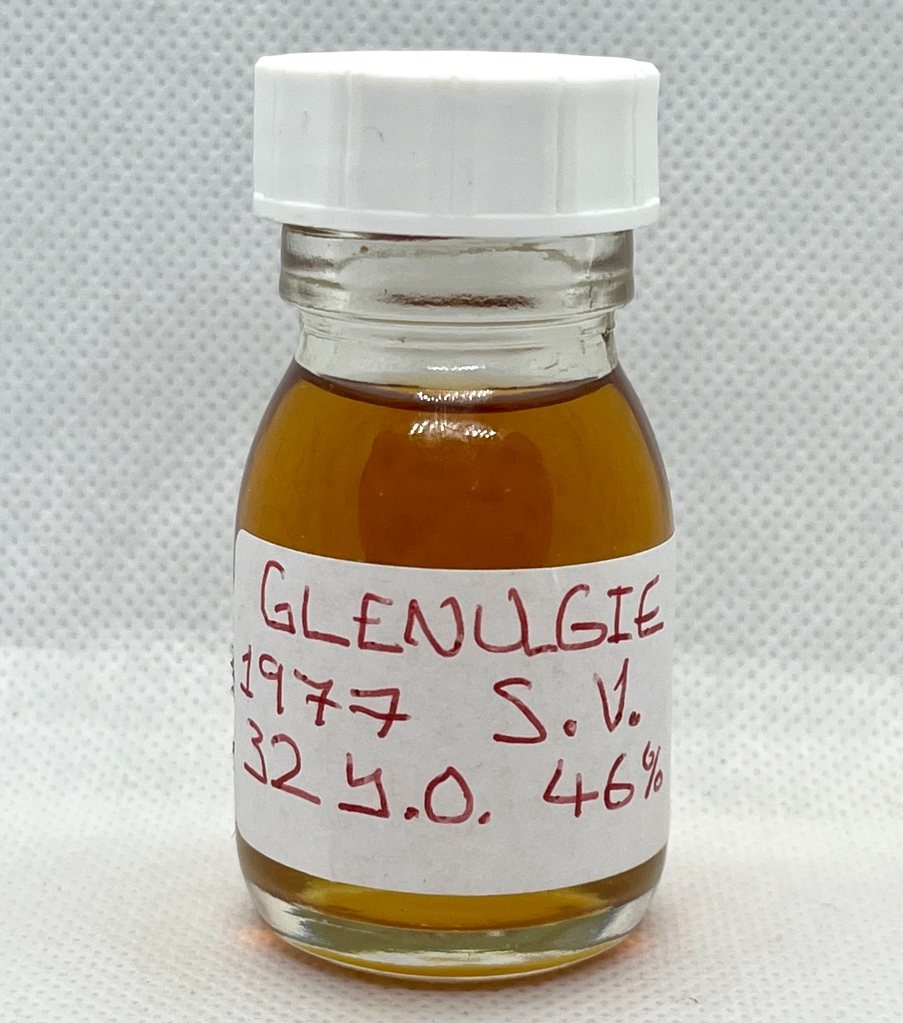
You don’t know what you’ve got until it’s gone.
There’s another music tie to my blog which any Joni Mitchell fan should recognise. It occurs to me that this is probably the very last dram from that bottle, and could very well be the last Glenugie I will ever taste. I would imagine that there can’t be a lot of stock left, if any. Even if there is, the chances of me being able to afford it are minimal. Who would have thought that one day Glenugie would close never to reopen? I remember childhood trips to Peterhead seeing the old distillery on the way past then bit by bit they knocked it down so that the land could serve another purpose for the offshore industry. In a paraphrase again from the same Joni Mitchell song, ‘paradise was paved’ and now is lost.
The fall of One-Up could be a tale for people in whisky to take notice of. Both have suffered (or could suffer) in part due to events outwith their control. For One-Up it was the loss of their market thanks to online streaming and downloads, negating the need for people to own a physical product. While the whisky industry doesn’t have that same issue while it’s in boom times, I feel that the industry has some serious underlying health issues that could cause problems.
The UK economy is not in the best of health either, but some of this is down to governmental ideology and incompetence, but also one has to look at the cutbacks at Goldman Sachs (here and here), Morgan Stanley (here), Barclays, Morgan Stanley and Citibank (here) as well as the warnings from the World Bank (here and here) that all is far from well in the global economy. If I was a luxury goods manufacturer then I’d be concerned, and let’s face it, whisky is such a thing. And there are signs that alcohol consumption hasn’t returned to pre-pandemic levels, indicating that globally the consumer markets aren’t going the way the producers may wish – see this link – Alcohol sales lower than pre-pandemic level in Europe
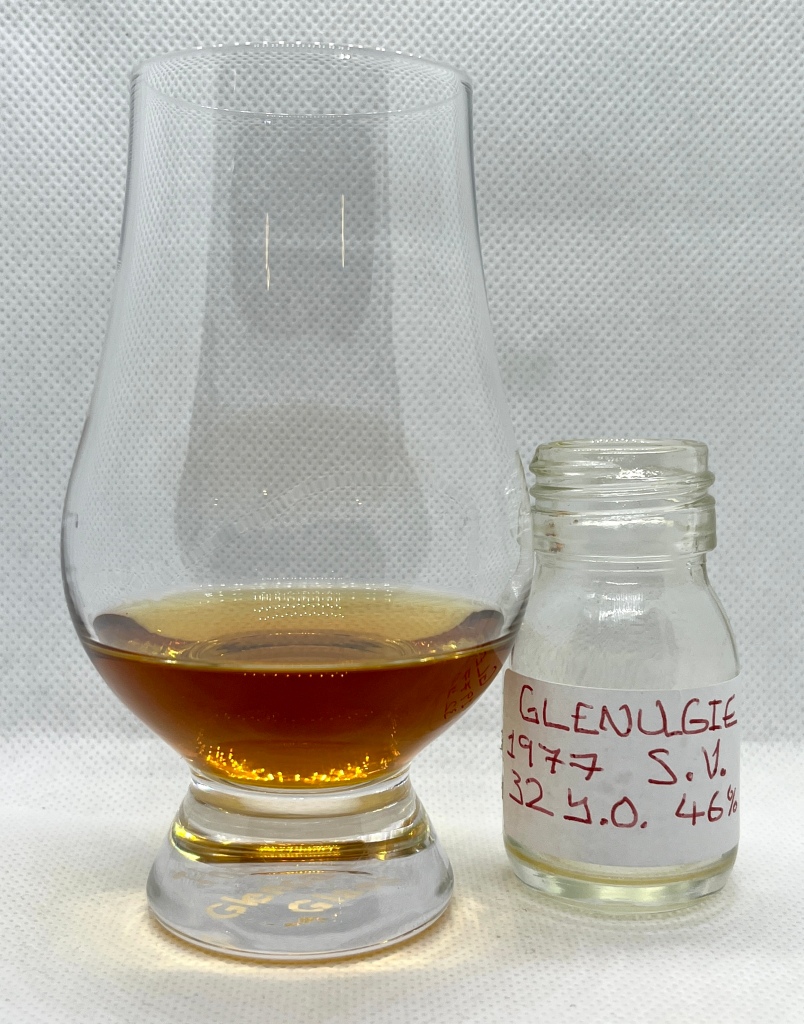
I’ve been speaking of the possibility of recession for a while now, more so since the global economy has been distorted by the COVID pandemic, and Europe has been affected by the Ukraine war, These sort of events aren’t predictable, but this is also a good reason for why unrestricted growth of an industry isn’t always a good idea, yet this is what is happening within the collective whisky industry now. Many distilleries are going flat out to make up stocks, with the past decade of expansion to existing sites such as Macallan, Glenfiddich and Glenlivet just to name three. There are a wealth of new distilleries over the past 10 years with many more yet to start selling a product. If there is to be a recession, have the distilleries yet to start missed the boat? Could be a disaster for those depending on selling 3 year old spirit, especially if nobody has the money to pay some of the adventurous prices some think is an appropriate charge for bare minimum aged spirit.
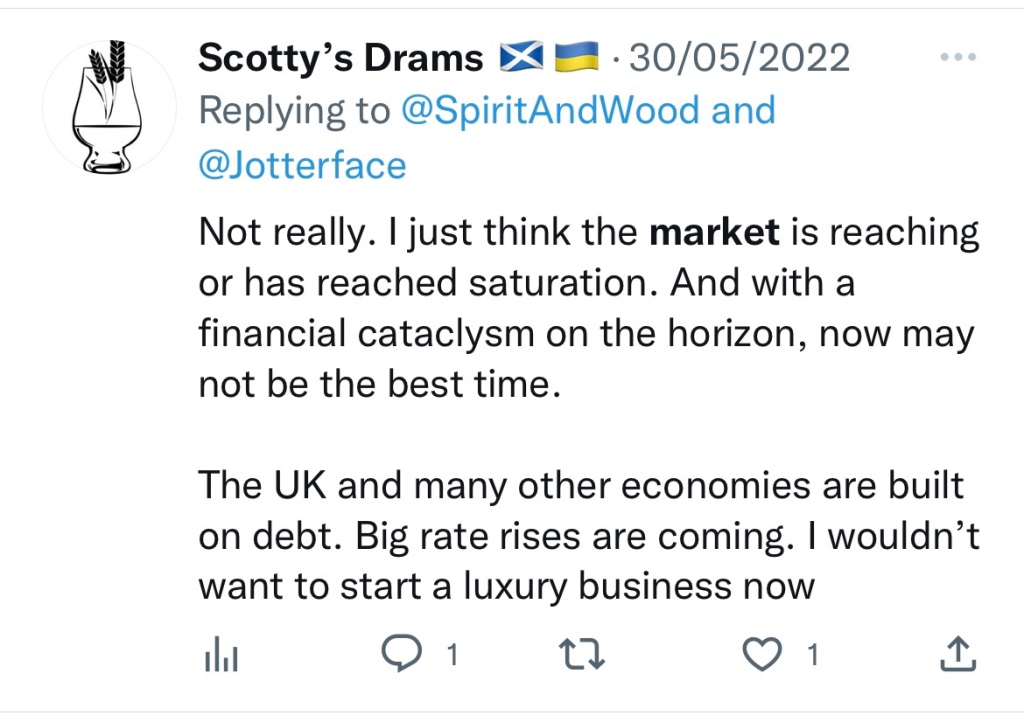
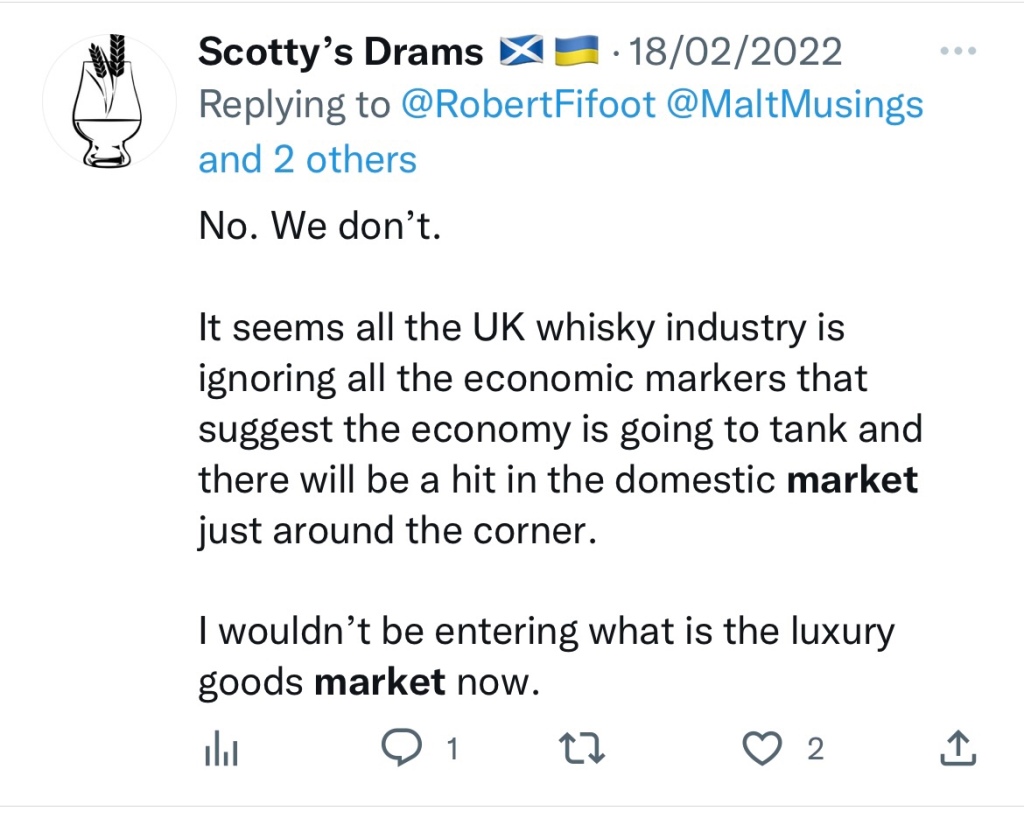
And this is the trouble with unrestricted and untempered growth; nobody is looking to the downsides. So far there is no sign that consumers are slowing down, but these things can happen suddenly, just like the effects of natural disaster. Producers have to be able to predict trends of what will be popular in 10-20 years time when the spirit matures, and that my friends is near on impossible to do. It’s like driving down a dark country lane at full speed, and suddenly switching off your headlights. You have an idea of the way ahead, but realistically you have no true idea of what is coming, and there could be a crash. In the event of that situation, one should have thoughts and prayers for those investing in casks. Should there be a change in customer demand resulting in a downturn in demand for matured whisky, then what about those privately owned casks? Who is going to pay a premium for a cask that there isn’t a demand for? Especially if everybody is trying to sell their “Glen Investment” casks at the same time, when many may mature at the same time? Could be sad times for those who let brokers overcharge them in the first place.
The health of the industry in my opinion is developing another sickness, and that of premiumisation. We’ve seen prices go up with the cost of inflation, but not all increases are so driven in my opinion. Talisker 18 doubled in price, Lagavulin 16 took a price lurch in the wrong direction. Premium whisky is going to place the whisky enthusiast drinker into narrowing price points they don’t want to be in, with more aged whiskies being less affordable. So while we have a booming production rate now, we could still effectively end up with less choice, and falling demand in one sector as many more become reluctant to push past the £100 barrier for a bottle.
Twitter user @whiskyresource has ran a poll for 24 hrs to get an idea of how enthusiasts see the future of whisky and it doesn’t paint that rosy a picture. Judge for yourself. NAS whisky is a backwards step that many enthusiasts reject. We’ve been pushing for years to gain more transparency, as an age statement gives us some sort of quantifiable quality. While it means we aren’t guaranteed of quality, we’ll get an idea that we aren’t paying through the nose for the youngest possible spirit that NAS bottlings can hide.
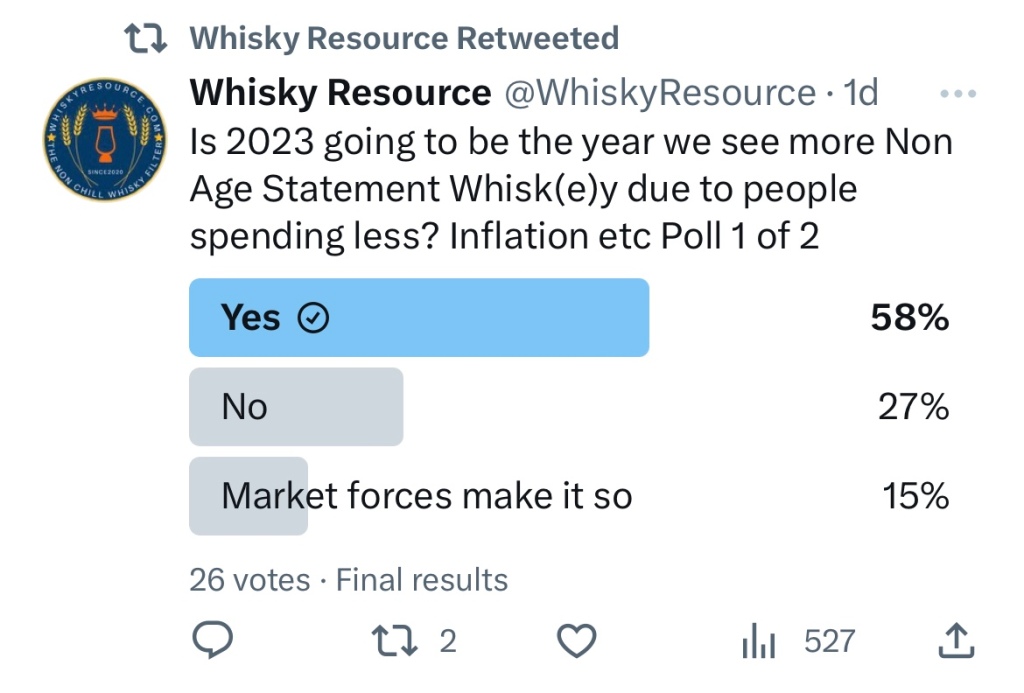
In the second poll, the next question is whether or not people are reconsidering their comfort zones for buying whisky. And it seems many are. I’ve heard stories that some drinkers are rejecting the primary market and using auctions for purchasing core bottles rather than retailers. Not only can this be a lot cheaper when buying bottles still easily available, producers and retailers should remember that this doesn’t put the money in their pockets.
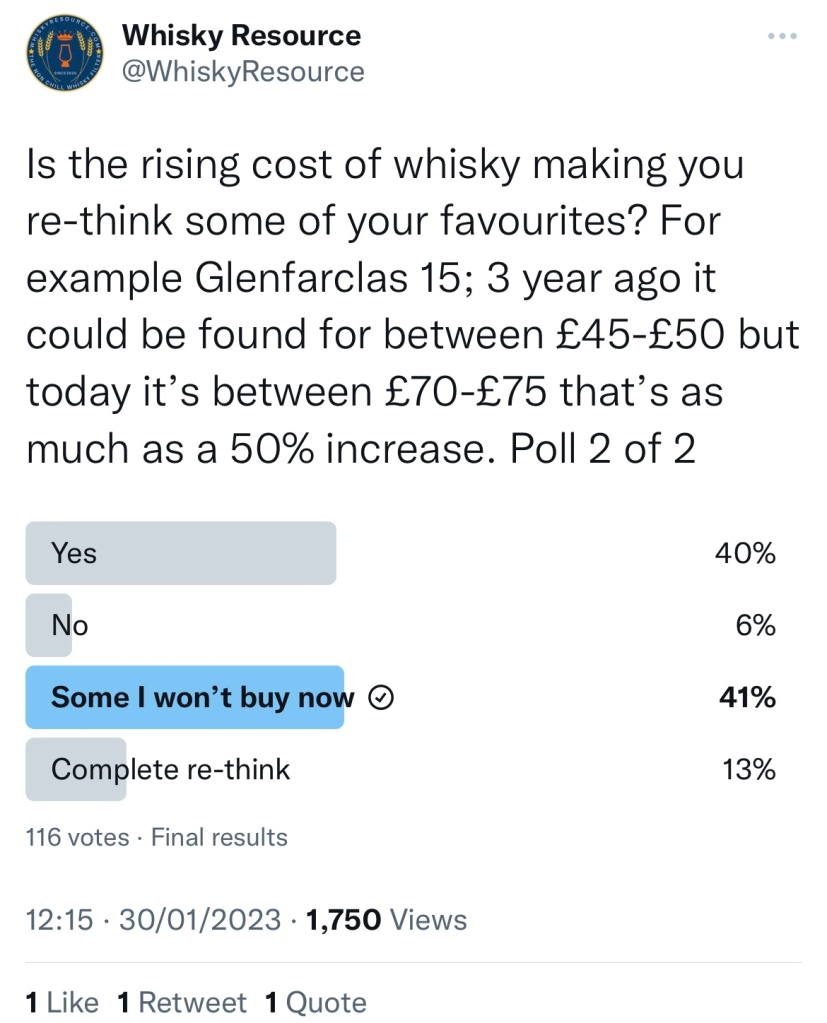
Make of this what you will. But I agree with the result. Bottles like Glendronach 18 are now off the cards and I’m grateful for the bottles in storage. Both polls aren’t conclusive but show what some of the online community think.
I don’t think things will be as bad as in the 1980’s yet worryingly, many pubs are really struggling at the moment and it’s getting more regular to hear of breweries in the craft beer industry that have fallen victim to economic pressures. I’m hearing rumours that the gin boom is over too. And it’s due to get worse with the Bank Of England telling the BBC that “the UK is still likely to fall into a long, shallow depression.” This, coupled with staffing issues in many industries giving workers a good basis in pushing for higher wages will keep prices high and not necessarily helping inflation fall. But what if a predicted UK and global recession is deeper than predicted? It is not outside the realms of possibility we’ll see distilleries close, even if only temporarily. What if the war in the Ukraine affects the global economy negatively again? This is a risk that may be very real, and out of control of the whisky producers.
While I don’t mean to preach that the end of the world is coming for the whisky industry, which has been cyclic for most of its existence, the truth of what goes up must eventually come down still exists. Will it be the higher the climb the greater the fall? Make the most of what we have. Value the good whiskies. People finding how good the likes of Imperial, Glenugie, Convalmore and others can be are now faced with limited stock or non-existent stock, with what is available already being in bottles. Enjoying quality whisky now could be key to our experiences as affordable aged whisky becomes out of reach for us. Indeed, this Glenugie is already out of my drinking comfort zone, but something more relevant is that Glendronach 18 was under £80 and now, easily £105. Once a staple, now a luxury to many more people.
It’s little wonder I would find concerning when I read this latest article from the Herald Scotland where a Borders Farmer is looking to find funding to the tune of £53 million pounds to fund a brand new grain distillery. The article mentions the fact fianancial recession, the aim of premiumisation, and supplying grain neutral spirit for gin. I read it in disbelief as I somewhat believe he’s missed the boat totally. I hope it works out for him, but the timing doesn’t seem to be on his side in my opinion. The other side of the story though is that speaking to someone with more insight into the industry than I have is that this plant could well be needed if Diageo pull the plug on supplying grain whisky to other blenders. Still, a brave decision to have to make when hedging your bets.

A fitting thought to attach as the conclusions from the tasting could be thus – now that the whisky is gone, the long sweet taste is reminding me of a time gone by as a child. Indeed, I still was one when Glenugie closed. My younger brother was born in the year this dram was distilled. Nobody had an inkling what was to be round the corner for the distillery or the industry. Perhaps this is where we find ourselves again now?
I’d be a fool in failing to acknowledge any potential upsides – the main one being that my opinion maybe completely wrong, and that we’ve really never had it so good and will continue to do so. Should interest rates not continue to climb to control inflation, and energy prices drop significantly, disaster will be averted. In the rhythmic ups and downs of the industry, probability means I’ll be right to some degree eventually, but I suspect it’s closer than many may want to think. If it comes to pass that the whisky enthusiasts have to endure limited choice due to price increases or lack of availability, then perhaps now was a good time to have my Glenugie, while listening to some music bought from One-Up and thinking about how good things used to be.
Yours In Spirits
Scotty
Photo Credits
Signatory Glenugie bottle – Nick (twitter @ayewhisky)
All Other Photos – Authors Own
Tweet Screen Grabs – Twitter.com